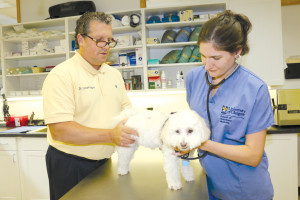By David Fleet
Editor
Chloe Grounds recalls a recent four week stint at the Jivdaya Charitable Trust, a non-government animal welfare organization that provides medical care to un-owned domestic animals in Ahmedabad, India.
“We treated anything that came in the clinic,” said Grounds, 25, a 2010 Brandon High School graduate and former Brandon Township resident. “The major cultural difference in India compared to other countries is that many vets will not euthanize due to their religion. There’s a lot of animals that come in who are injured as the results of road traffic accidents. A lot should have been euthanized, rather we could just give pain medication and send them out. We did a lot of good work there but—it was very difficult to just turn them back on the streets in pain.”
Grounds’ rigorous experience in Ahmedabad is part of a unique overseas veterinarian education at the School of Veterinary Medicine at the University of Glasgow, Scotland. She has completed three of five years and this past summer returned home to spend two weeks shadowing Ortonville Veterinarian Dr. Lincoln Baylis—a long time friend and mentor.
“The Vet School at Glasgow was my dream school,” said Grounds who attended Alma College where she earned a bachelor of science degree in biology in 2014.
“I applied to five veterinary schools and it just happened that Glasgow was the only one I was accepted to,” she said. “I had visited Scotland once when I was an undergraduate during a four week course Alma College and fell in love with the country. It’s just like a postcard there. The air is clean and there are expansive farms—sheep everywhere. It’s a cooler climate and rains all the time. It’s also common for men to wear kilts.”
Classes were a culture shock, said Grounds.
“About a third of the class were Americans,” she said. “The UK students can attend classes in the veterinarian school right out high school. The student ages in the classes ranged from 17 years old to about 33—there were many undergraduates.”
With a population of about 600,000 Glasgow is a bustling city.
“Public transportation is amazing,” she said. “They play bagpipes on the street and the drinking age is 18 years old. They have crime too—still it’s a very friendly community.”
Grounds lives in Glasgow with her husband Adam.
“We moved together in 2014 and Adam is working on a degree in animal welfare of UG,” she said. “The vet school is large animal and herd health based. Many of the graduates stay and practice in Scotland as a veterinarians. A lot of the work is cutting edge —when I’m done I hope to specialize in exotic animals—not just dogs and cats. Many exotic pet owners don’t realize how to take care of them. Often it’s an easy fix to what ever problem the exotic animal may be having.”
Grounds attraction to exotic pets includes “Reggie,” a six foot boa constrictor named after a snake in a Indiana Jones movie.
Reggie was the result of an accidental boa pregnancy at Alma College.
“We had three boas at Alma College—two females and a male,” she said. “I was animal care worker and the boas got mixed up in the wrong tanks at a college animal show. So we ended up 28 live boas—the professor said I could have one. So I got Reggie, he’s just like a big puppy, easy going and very docile. Reggie stays with my inlaws while I’m in Scotland.”
The veterinarian program at the University of Glasgow is five years which includes three years of rotations. The program also requires several weeks of extramural study. In addition to Ahmedabad, India, Grounds also served two weeks at the Bluemoon Animal Centre in Hurghada, Egypt—a beach resort town with a population of about 400,000 along Egypt’s Red Sea coast.
“We had many camels, monkeys and turtles come into the clinic,” she said. “We see a lot of different cultures and treat a variety of species of animals as veterinarian.”
Grounds returned in September for her final two years of veterinarian school.
“Vet school is very hard to get into and is very competitive,” she said. “And no one is doing it for any other reason then they love animals. Our profession ranks up there with a high amount of depression and a high amount of suicides. In the next 10 years the biggest challenge for vets is managing their mental health.”
Euthanasia has it’s place in veterinarian medicine, said Grounds.
“We as veterinarians are animal lovers and find it very hard to euthanize in any situation,” she said. “I’ve talked to a lot of vets and they have never got use to that—I’ll have to get used to it in my career. Still at the end of the day we are most concerned about quality of life for animals. Often it’s prolonging the enviable but, it’s your job to offer the options to the animal owners.”
